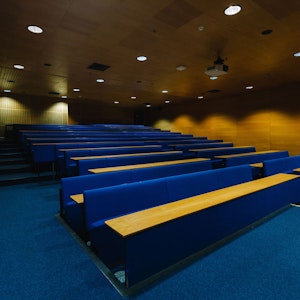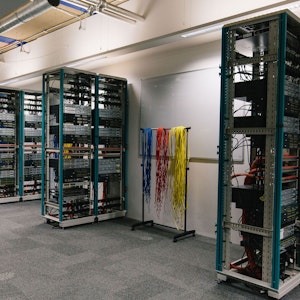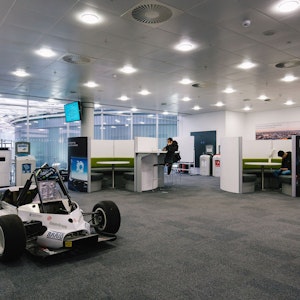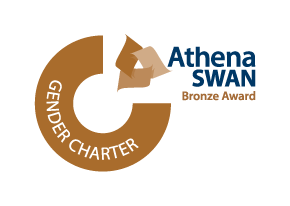
Computer Networks and Security with a Foundation Year - BSc (Hons)
Currently viewing course to start in 2024/25 Entry.
Fascinated by cyber security in today’s society? It’s a key concern for modern organisations in our digital world. BSc Computer Networks and Security with a Foundation Year focuses on the practical needs of businesses that require high quality computer and network security, ensuring you’re equipped for a career in this increasingly important industry....
- Level Foundation
- Study mode Full Time
- Location City Centre
- Award BSc (Hons)
- Start date September 2024
- Fees View course fees
- School School of Computing and Digital Technology
- Faculty Faculty of Computing, Engineering and The Built Environment
This course is:
Open to International Students
Overview
I'm a third year Music Technology student. When I was looking for Music Technology courses, Birmingham City University really stood out to me. I was keen on attending a Bachelor of Science and the course really focussed on the science aspects as well as maintaining the artistic elements of music and sound production. The support of the tutors has been fantastic. The professional standard and the facilities on campus are great due to their accessibility around the clock. The easy access to studios has been extremely helpful in completing my work and keeping on top of deadlines. At BCU, there's been a heavy focus on employability and what I could do with all aspects of my degree. The university has organised the industrial mentor forum, a space where students can communicate with alumni and people within the industry. The Acoustics Special Interest Group also consisted of more bespoke talks from people within the acoustics industry about different aspects of the work and how individual companies run. This is how I developed contact with an acoustic consultancy to complete my placement year. I act as an Acoustic Technician at Dragonfly Consulting. It went so well that I'm returning upon my graduation to continue working with them. The university has given me opportunities I don't think I would have received anywhere else.
I'm a second year computer science student studying at Birmingham City University. As a Computing student, there are plenty of computer labs available. There's entire rooms filled with Cisco networking equipment, as well as laptops that can be rented out to complete your work. Several of the facilities have now moved over to STEAMhouse, which is a £70 million build that is now the new home for Computing and Digital Technology students. One of the main things for me was getting employment at the end of my university degree. And Birmingham City University offers a wealth support for moving into the work environment. The course is a very important focus and a very industry focussed as well. I've been offered roles as a student demonstrator for Python programming. I found that the best way to show that you've understood something is to be able to teach somebody else.
I'm studying Computer Networks and Security. So far, I've really enjoyed my time at BCU. I felt really included within the student community. For the past two years, I've been involved in Innovation Fest. This is an annual event that showcases student work from the faculty. A lot of employers visit this festival, which allows us to widen our professional network. Throughout my time at BCU, I've had some time to
develop a relationship with the Careers+ team and go through tailoring my CV and my cover letters with them. Because of this, I have been presented with many opportunities which they have tailored to me and my needs. Through this, I was encouraged to apply for the women in tech competition.
So it was a one week program and I was working with the team from Cyferd. It's a software company,
and I successfully won and have taken up the placement year with them as a Junior Development Lead.
I look forward to coming back and applying the skills I've learnt throughout my placement and applied them within my studies.
Fascinated by cyber security in today’s society? It’s a key concern for modern organisations in our digital world. BSc Computer Networks and Security with a Foundation Year focuses on the practical needs of businesses that require high quality computer and network security, ensuring you’re equipped for a career in this increasingly important industry.
Birmingham City University is also home to Cisco Systems and the Microsoft Academy Centre.
About the Foundation Year
The Foundation Year course option enables you to study for our BSc (Hons) degree over an extended full-time duration of four years by including a Foundation Certificate (year one of four). The Foundation Certificate provides a broad study course that underpins the follow-on degree. In order to progress to the next year of your degree, it is necessary to achieve a pass in all of the modules of the Foundation Certificate.

Introducing STEAMhouse
STEAMhouse is a centre for technology, innovation, creative thinking, prototyping and business development. Our brand new £70 million pound building is the new home for the School of Computing and Digital Technology.
What's covered in this course?
This four year degree takes a practice-led approach, making use of equipment and tools found in the industry to give you the best preparation for a successful career. Our approach prioritises the practical skills sought by industry, backing this up with a thorough understanding of theory. The course delivers the latest in computing, network and security technologies, with the opportunity to gain additional accreditation from Cisco, Juniper, Huawei and the Linux Professional Institute.
The course delivers a well-rounded curriculum in computer network engineering, programming, server systems, security theory and practice, as well as management-level skills such as project and change management, maximizing your career potential.
Upon graduation you could progress into a career as a network security engineer, network administrator, and network security analyst or network security architect.
Accredited By
This course is accredited by:
I always recommend Birmingham City University to students wishing to go to the UK for studies and six of them so far have listened to my advice!
Muhammad Sagir Usman
Why Choose Us?
- Brand new facilities at STEAMhouse - This state-of-the-art building is the new home for our Computing courses. Based at our expanding City Centre Campus, this unique centre will give you access to outstanding facilities and teaching spaces, as well as opportunities to collaborate with people and businesses across multiple sectors and work on real industry-based projects.
- Multi-Industry partnerships - We are home to Cisco Systems and the Microsoft Academy Centre As one of Microsoft’s top UK university-based academies, we are a member of the Microsoft Developer Network Academic Alliance. This means we are able to use various Microsoft software products and online resources for research
- Industry connections - We are also a Cisco ASC (Academy Support Centre) and Cisco Instructor Training Centre (ITC)
- State-of-the-art facilities - You will be based at Millennium Point within our City Centre Campus, where we have recently invested £6.5 million in IT facilities and labs to give you access to the latest technology and familiarise yourself with systems that will be sought after by employers
- Optional placement year - You will have the option to carry out a placement year, in between your second and final year, and gain professional qualifications from vendors such as Microsoft, Cisco and Linux Professional Institute.
Open Days
Join us for an on-campus Open Day where you'll be able to meet us in person. Booking for the next event isn’t open yet. Register your interest below and we’ll email you as soon as booking goes live.
Next Open Day: 29 June 2024
Entry Requirements
These entry requirements apply for entry in 2024/25.
All required qualifications/grades must have been achieved and evidenced at the earliest opportunity after accepting an offer to help confirm admission and allow for on-time enrolment. This can also include other requirements, like a fee status form and relevant documents. Applicants can track their application and outstanding information requests through their BCU mySRS account.
Essential requirements
80 UCAS tariff points
If you have a qualification that is not listed, please contact us.
Fees & How to Apply
UK students
Annual and modular tuition fees shown are applicable to the first year of study. The University reserves the right to increase fees for subsequent years of study in line with increases in inflation (capped at 5%) or to reflect changes in Government funding policies or changes agreed by Parliament. View fees for continuing students.
Award: BSc (Hons)
Starting: Sep 2024
- Mode
- Duration
- Fees
- Full Time
- 4 years
- £9,250 in 2024/25
- Apply via UCAS
International students
Annual and modular tuition fees shown are applicable to the first year of study. The University reserves the right to increase fees for subsequent years of study in line with increases in inflation (capped at 5%) or to reflect changes in Government funding policies or changes agreed by Parliament. View fees for continuing students.
Award: BSc (Hons)
Starting: Sep 2024
- Mode
- Duration
- Fees
- Full Time
- 4 years
- £16,085 in 2024/25
Guidance for UK students
UK students applying for most undergraduate degree courses in the UK will need to apply through UCAS.
The Universities and Colleges Admissions Service (UCAS) is a UK organisation responsible for managing applications to university and college.
Applying through UCAS
- Register with UCAS
- Login to UCAS and complete your details
- Select your course and write a personal statement
- Get a reference
- Pay your application fee and submit your application
Course in Depth
Foundation Year
In order to complete this course, you must successfully complete all the following CORE modules (totalling 120 credits).
The Foundation Mathematics module provides the basic knowledge and mathematical skills which will equip the students to continue their studies to an undergraduate programme. The module will be focused on mathematics related to the field of computing.
The interactive taught sessions will use fundamental mathematical in discussions to broaden understanding of the theory and practice introduced in the module. Additional support materials will be made available on the module Moodle website.
This module will provide you with an understanding of the role of digital technologies in transforming industries and sectors. It will provide you with a comprehensive introduction to core concepts of science for digital technology, and an understanding of the fundamental aspects of science essential for studying and working with digital technologies.
You will learn systems thinking methodologies to model systems supported by digital technologies, enabling you to understand different aspects of technology, and to design your own solutions. Moreover, this module will help you to develop essential academic and personal study skills necessary for success in higher education. It will provide you with basic research, academic writing, and reflection skills. These skills are vital for your transition to higher education and will enhance your learning and academic growth.
This module provides the skills necessary to design a web based application around a clear understanding of the business information requirements, a structured design of an interface and the development skills necessary to implement a solution.
This module focuses on varied technologies relating to the design and development of application to meet the information needs of a business. The module will analyse and design an application that meets current web standards.
This module will provide you with an introduction to digital media technology and will allow you to explore technology-driven change in the media industry.
This module will introduce the fundamentals of audio / video capture and editing allowing you to explore workflow practices. You will document your development process, including aspects such as storyboarding and risk assessments and will create an artefact that relates to technology in your chosen degree or industry.
During the journey within higher education, developing your independent study is an essential skill to support shaping the knowledge to become more useful and applied within practice. This module aims to provide you with necessary skills and tips that should support you to work independently within your discipline and to successfully apply project management tools and techniques to a mini project related to your subject discipline.
Foundations of programming aims to provide you with the fundamental principles and practice-based activities needed to begin developing software programs. The module details the anatomy of a structured software program that includes the creation of a program algorithm, a logical, simple and organised program flow and the generation of pseudo and programming code.
The module uses a combination of theory and practice-based sessions designed to engage students in group and individual activities to identify the components of a software program and to apply their knowledge into hands-on software programming activities. During the module sessions you will acquire the basic skills to design and create software programs.
First Year
In order to complete this course, you must successfully complete all the following CORE modules (totalling 120 credits).
This first-year project allows you to develop and cultivate a creative mind-set through collaborative innovative practice, allowing you to bring together knowledge and imagination to construct a viable product. It is an opportunity to express your ideas, skills and talent to the wider community of innovative practice.
The project provides you with an opportunity to be part of a thriving community of innovators that practices connected learning. This is facilitated by putting you into inter-disciplinary project teams supported by innovation mentors, advisors and academics; culminating in you exhibiting your work to an international panel of experts.
Within the Computer Systems Module, you will gain knowledge and experience of computers and computer hardware.
This module presents a holistic view of how computer systems work and it also provides the underpinning knowledge required:
- for the design of computer architecture
- to show how software interacts with hardware
- to apply electronics principles
- to use number systems for computer technology
In this module, you learn how modern operating systems are the glue that bind computer hardware and networks together and how they manage the user experience for individual computers and wider networks. We will focus on the function and purpose of operating systems, with a focus on hands-on practical skills. We will build on learning from your networking, programming and computer systems modules, enhancing and extending skills in all these areas. You will make heavy use of Open Source Software, demonstrating what can be achieved with this huge publicly shareable resource on a very limited budget.
This introductory computer programming module provides the underpinning knowledge and practice for computing students to design, build and test software components. The module will make use of practical sessions primarily to allow you to apply programming principles and constructs in order to creatively solve problems by means of developing small programs. Module content and assessment enables learners to acquire programming skills in a modern imperative language.
The module gives you the opportunity to learn mathematical concepts and methods and critically reflect on how they relate to computing and communication systems. You will develop core mathematical and statistical skills which are fundamental in computing and technical work in general. You will be expected to solve mathematical and statistical problems on paper and on a computer.
The module provides the opportunity to learn and critically reflect the skills required in building and designing basic networks and their requirements within a network infrastructure. This module builds on the underpinning knowledge and theory of networking systems.
The module consists of:
- Subject specific lectures/laboratory sessions to introduce knowledge and skills relevant to network and information systems, along with communication architecture
- Lectures/laboratory sessions to introduce principles and techniques for information communication within a network and ensuring effective communication
- Global view on information system communication.
Second Year
In order to complete this course, you must successfully complete all the following CORE modules (totalling 120 credits).
This module forms part of the Research and Enterprise strand that runs through each programme curriculum from level 4 to 7. It builds on the core concepts, which were introduced to you at level 4 in the practice based computing related modules and the underpinning role innovation plays in this.
As you have chosen to major in developing your technical capability, knowledge and skills required for you chosen career path, this module is designed to draw upon your technical learning framework through Reflection, Evaluation, Entrepreneurialism and Management (REEM). REEM forms the principles of this module allowing you to explore and to further build on your strengths and achievements to pursue excellence in a professional context.
The module provides you with an opportunity to build on the learning and to develop knowledge of cyber security and how it relates to information and network security. This module will allow you to learn how to protect a network system from issues of cybercrime, based on security principles and the principles of how to defend networks from attack.
Within the module Server Systems, you will learn that servers are the engines that deliver the data of the worldwide Internet and cloud revolution. In this module you will learn how to design, configure and troubleshoot servers to provide both the data and network services required in modern networks. You will spend a lot of time actually configuring and troubleshooting servers in this module to give you the hands-on skills required by industry. This will be backed up by theory delivered via videos and reading and short lectures.
This module builds on your foundational programming knowledge and skills developed during the Level 4 Computer Programming module to extend and focus these towards the area of network engineering. It provides an essential skillset for network engineers to manage and develop networks/networking applications. This aids the management of complex networks by allowing the automation of regular tasks and the potential reduction of human error when configuring multiple devices.
In this module you will have the opportunity to learn and critically reflect on the skills required for Network Technologies. This module builds your knowledge and underpinning theory for the networking modules and you will review the requirements from a small to medium scale network deployment engineering context.
This module allows you to examine network technology, applications and protocols to enable you to gain a thorough understanding of the developments in this area. Routing and switching will be investigated theoretically and practically using a variety of different network operating systems and devices. The module content builds on the networking technologies introduced previously, and focuses on developing design and implementation skills relevant to achieving industry certification applicable to small and medium enterprise networks.
Final Year
In order to complete this course, you must successfully complete all the following CORE modules (totalling 120 credits).
The purpose of the module is to enable you to undertake a sustained, in-depth and research-informed project exploring an area that is of personal interest to you. In agreement with your supervisor, you will decide upon your topic which will take the form of a practical outcome (artefact) with accompanying contextual material. The main consideration when choosing your topic is that it must be aligned to the programme you are studying, and you should consider the relevance of this topic to your future academic or professional development.
At this level, you will be expected to work independently but you will receive additional one-to-one support from your supervisor, who will be familiar with your chosen topic area. As you progress on the module, extra support will be available and this may take the form of group seminars, workshops and online materials that will help to develop your project.
The module provides you with an opportunity to learn and critically reflect on the skills of Ethical Hacking and information security within a global context. This module builds on the knowledge and underpinning theory from the networking modules and reviews the requirements for a secure network communication system.
The module gives you an opportunity to learn and critically reflect on the skills of wireless network design. This module builds on the knowledge and underpinning theory from the networking modules and reviews the requirements for a secure wireless network communication system.
The module consists of:
- Subject specific lectures/workshops to introduce knowledge and skills relevant to wireless networking and the corresponding state of the art technologies.
- Lectures/workshops to introduce principles and techniques for secure communication within a wireless network and ensuring security of data in transit.
- Global view on information security and the changing requirements for information and data communication security.
The module provides you with an opportunity to gain experience and critically reflect on the skills of software and information security within a global context. This module builds on the knowledge and underpinning theory from the networking modules and reviews the requirements for a secure network communication system.
The module is an opportunity for you to learn and critically reflect on the skills of network and information security within a global context. This module builds on the knowledge and underpinning theory from the networking modules and reviews the requirements for a secure network communication system.
Download course specification
Download nowWe think it’s important that you are assessed in a number of different ways during your Computer Networks and Security BSc (Hons) course. These will include including continuous assessment, in-class tests, examinations, laboratory exercises and project work.
International Opportunities
You are able to apply to undertake part of your studies abroad, allowing you to experience life and studying in another country at one of our exchange partner universities.
This offers a unique opportunity to enhance your CV and experience new cultures.
Student stories
 Can Wang
Can Wang
The course I am studying is part of a four-year joint programme of studies with Nanjing University of Science and Technology (NUST). The first two years were at NUST and the final two years are at Birmingham City University, providing me with a unique opportunity to gain a Bachelor’s degree.
The HOST UK scheme arranges visits for international students to British families’ homes. Birmingham City University will pay the cost for you to apply for a visit. It is a good way to experience British culture. I have really enjoyed it.
Apart from gaining a UK degree and expanding my knowledge, the Computer Networks and Security course has embedded in it the latest vendor-specific curriculum, which offers the opportunity to attain the Cisco Certified Network Associate (CCNA) professional qualification.
 Austin Moses
Austin Moses
Cisco Certified Internetwork Expert (CCIE) certification
There’s no disputing Austin Moses’ determination to succeed. The tenacious student put himself through university by working full-time in an off-licence – and still found the energy to achieve a first class honours degree, a sought-after prize and a position with Cisco.
Although he has dyslexia, Austin clearly didn’t let it stand in his way. He is full of praise for the University’s support systems. “I received extra tuition and proof reading that not only helped me polish up the work I was handing in but also taught me ‘survival’ skills that I can use to not be so disadvantaged,” he says. He also has great respect for the teaching staff and enjoyed ”learning from people with a passion and experience in the field in which they are teaching”.

Athena Swan Bronze Award
We have successfully secured the Athena SWAN Departmental Bronze Award recognising a commitment to gender equality.
The Athena Swan Charter is a framework which is used across the globe to support and transform gender equality within higher education (HE) and research.
Employability
Enhancing your employability
Your studies here will equip you with the practical and academic skills that will help you to stand out when you look for your first professional role.
Because we have strong links with companies such as SAS, Microsoft, Cisco and Capgemini, you have the chance to work with and understand the workings of real-life industry from early on in your degree studies.
You will have access to world-class facilities throughout your time here and these will help you to be a highly employable graduate.
The University has a Graduate+ programme, an extracurricular awards framework that is designed to augment the subject-based skills that you’ve developed throughout the programme with broader employability attributes, which will enhance your employability options upon graduating.
Placements
You have the option undertake an assessed sandwich year between your second and third year, which will provide you with valuable work experience and give you the real-life skills you need.
International
Birmingham City University is a vibrant and multicultural university in the heart of a modern and diverse city. We welcome many international students every year – there are currently students from more than 80 countries among our student community.
The University is conveniently placed, with Birmingham International Airport nearby and first-rate transport connections to London and the rest of the UK.
Our international pages contain a wealth of information for international students who are considering applying to study here, including:
- Explore some of the good reasons why you should study here.
- Find out how to improve your language skills before starting your studies.
- Find all the information relevant to applicants from your country.
- Learn where to find financial support for your studies.
Facilities & Staff
Our Facilities
We are constantly investing in our estate and are currently in the process of spending £260 million on new learning facilities. This course will be taught at Millennium Point at the City Centre Campus.
The course is supported with a wide range of cutting-edge facilities in the City Centre Campus. We have a state-of-the-art computer games technology lab which contains high-performance PCs, Sony PlayStation development kits and a range of industry standard software including Unity, Unreal and a suite of professional Microsoft development tools.
We also have many open access areas where students can study together and even hire out laptops for use in these spaces and others within the university.
Within the University there are many internationally recognised research teams giving you the opportunity to collaborate with them on exciting interdisciplinary projects.

Computer networking
The laboratories are well-equipped for all our computer networking courses, as well as specialist areas for practical work such as voice-over internet protocol (VoIP), forensic and ethical hacking technologies, wireless and mobile technologies and radio frequency identification technologies to name but a few.

Software development and computer programming
There are a number of open access, software development and computer programming laboratories that can be used to develop systems and programmes, including database management systems such as MySQL, to name but a few.
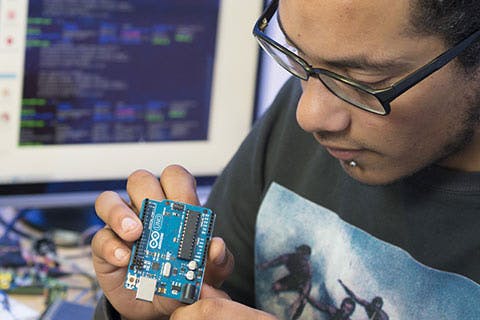
Systems laboratories
Our embedded systems laboratories are used to develop real-time systems, such as specialist hardware training and development resources, and industrial-standard software development and simulation tools. These include microcontroller software and robotics design and development, to name but a few.
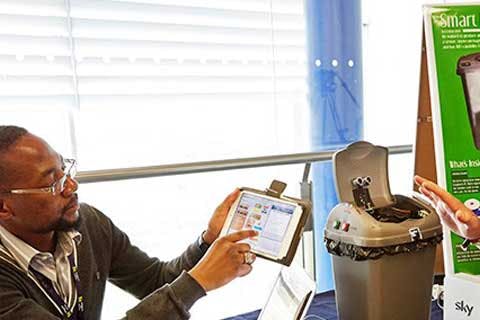
Electronic systems
To underpin the basic principles of electronic systems, we have a well-equipped laboratory of general and specialist test and measurement kits, including powered prototyping development boards, dual power supplies, frequency generators and counters and digital multi-meters to name but a few.
Forensic computing
Our successful development of forensic computing has led to a specialist forensics laboratory that is fully equipped with essential hardware and software for this sensitive area of study. The laboratory includes high-spec PCs with built-in multi interface Tableau write blockers, EnCase and FTK computer forensic software and steganography detection and analysis software, to name but a few.
More on our facilities
Our staff
Ron Austin
Associate Professor
Senior lecturer Ron Austin is the Associate Professor of the MSc Advanced Computer Networks course and teaches all network-related courses. His expertise and areas of interest include: Voice Over Internet Protocol (VoIP), security technologies, and forensic and ethical hacking.
More about Ron


